- Home
- Robert B. Parker
Gunman's Rhapsody Page 2
Gunman's Rhapsody Read online
Page 2
Both Earps said no. At the bar, Doc got two glasses of whiskey. As he turned from the bar, a big man in a black jacket with velvet lapels jostled him and Doc spilled one of the drinks onto the triangle of white shirt that showed above the last button of the black coat.
“You better be careful what you’re doing, skinny,” the man in the black coat said.
Doc stared at him for half a second and then threw the other drink into his face, glass and all. In a continuation of the gesture his hand continued on under his own coat and came out with a short silver Smith & Wesson revolver. He thumbed the hammer back as he drew the gun.
“Are you ready to die today?” Doc said.
There were red smudges on his cheekbones and his voice was high and metallic. He held the gun straight on the big man’s face.
The big man wiped the whiskey from his face and stared at Doc’s gun.
“You scrawny little bastard,” he said. “I ought to take that thing ’way from you and wring your goddamned neck.”
“Do it.” Doc’s voice had dropped to a shrill whisper. “Go ahead and do it, you sonova bitch.”
The space around the two men had cleared; one of the bartenders leaned across the bar and spoke to Doc.
“No sense to this, Doc, it was just an accident.”
Without taking his eyes off the big man, Doc swatted at the bartender with the back of his left hand. The bartender pulled his head back out of the way. Wyatt and Virgil got up from their table and walked over. They reached Doc at about the time the owner of the Oriental, Bill Joyce, appeared around the end of the bar.
“Goddammit, Doc,” Joyce shouted.
“You can be next,” Doc said.
The big man wasn’t backing down. He kept staring at Doc, his hand lingering close to his right hip.
Wyatt stepped in front of Doc, and Virgil stepped in close against the big man, pressing his own hip against the big man’s right hip.
“Enough,” Wyatt said. “Enough.”
“Get out of the way, Wyatt.”
Wyatt shook his head and with the palm of his open left hand gently pushed Doc’s gun away from the big man and up so that it pointed toward the pressed-tin ceiling of the bar. Then he closed his hand around the gun with two fingers between the hammer and the cartridge. They stood motionless for a moment in that posture and then Doc slowly opened his hand and Wyatt took the gun. He eased the hammer down and handed it to the bartender, who stowed it behind the bar.
Looking at the big man in the black coat across Wyatt’s shoulder, Doc said, “What’s your name?”
“John Tyler,” the big man said. “You better remember it.”
Doc smiled. “What’d you say it was?”
The two men looked at each other for another moment, each restrained by an Earp, then Tyler shrugged and turned and left the bar. He shrugged the collar up on his black coat and went outside without looking back. There was a brief surge of cold air as he opened the door and went out onto Allen Street.
By the time they got Doc back to the table the red smudge on his cheekbones had faded and the shrillness had left his voice. Bill Joyce sent him two fresh drinks. Doc picked up a glass of whiskey and held it up to the light. He examined it closely and smiled and nodded his head and drank it and put the empty glass down. Virgil had a sip of beer. Wyatt drank some coffee.
“Ought to drink more whiskey, Wyatt,” Doc said. “It’s very liberating.”
“Be liberating you right out of this world, one of these days,” Virgil said.
“Worse ways to go,” Doc said and drank from the other glass.
Three
Before he went to bed Wyatt put some wood into the big iron stove in the parlor. He left the bedroom door open so that the heat would spread. He put his revolver on the floor beside his bed and got in under the heavy quilt where Mattie lay on her back. He could smell the whiskey on her breath. As he settled in, she turned away from him on her side, her back to him. He didn’t mind. He felt no desire. When he was with her he felt leaden.
Helps keep the bed warm, he thought. Good for something.
She’d been fun once. A good-natured whore with an easy temperament when he’d met her in Dodge. His brothers had women with them, and Mattie Blaylock was eager to accommodate the man who’d run Clay Allison. But the fun had been mostly saloon fun. At home ironing his shirts, Mattie had lost much of the brightness that had gleamed in the gaslit cheer of the Long Branch. In truth, he realized, much of the brightness and the good nature had come from alcohol, and, domesticated, she could no longer consume enough of it, even boosted with laudanum, to be much more than the petulant slattern that was probably who she really was. Still, she could cook and her sewing brought in some money. And he didn’t have to spend much time with her. His brothers were here. There were prospects in Tombstone. There was money to be made. And he could use up most of his time trying to make it. Only at night did he feel loss, at night, or in those moments when she tried to make of their situation something more than it was. He hated her attempts to be affectionate, and he hated much worse her attempts to elicit affection from him. If she would merely provide him the domestic service he needed, he would ask for little more. A man needed a woman at home. Virgil had Allie, whom he considered a mouthy little bitch, but Virgil liked her. James and Jessie, Morgan and Lou, Wyatt and Mattie. He made a face in the cold darkness. Still, there was a symmetry to it, all the Earps, all their women. He thought about Josie Marcus with the big dark eyes whom he’d seen on stage. He knew she would be different. He felt his throat thicken, and the center of himself fold inward. He felt Mattie’s backside pressed against his under the comforter. He inched away, so that there was space between them, and thought no more of Josie Marcus, and lay leaden until he fell asleep.
Four
In July, Charlie Shibell, who was the Pima county sheriff, came over from Tucson and they ate antelope steaks, beans, and biscuits in the Can Can.
“Need a deputy,” Shibell said. “You got the background and I hear you got the temperament. You want the job?”
“How much?” Wyatt said.
“Pay ain’t the thing,” Shibell said. “Part of the job is to collect taxes; most of it’s easy collection-mining companies and the railroad. You keep a percentage.”
“Of everything I collect?”
“Yep.”
“Got to shoot anybody?”
“Not so often,” Shibell said. “When you do, you give me a voucher for the ammunition.”
“I got to keep regular hours?” Wyatt said.
“You mean, go to the jail and sit there every day? Hell no. You get them taxes collected, we’ll be happy over in Tucson.”
“I’m your man,” Wyatt said.
An hour later, with a star on his shirt, he walked up Allen Street to Vronan’s bowling alley, where his brother James tended bar. Wyatt had a badge again, like Virgil.
Behind the bar James poured his younger brother some coffee. He did it with his left hand. Wyatt knew he did almost everything with his left hand. He had taken a Rebel miniball in his right shoulder at Sharpsburg. And eighteen years later, his right arm still wasn’t much use. He could use it as a kind of support for his left hand, and he had learned to compensate so that most people didn’t notice that he was mostly one-handed until they had gotten to know him well.
“Morgan will want one too,” James said.
“He can do special deputy work for us,” Wyatt said.
“Virgil gets to be city marshal,” James said, “be a lot of special deputy work.”
Wyatt grinned.
“Better send for Warren,” he said. “Be work for all of us.”
Jim shook his head.
“Not my kind of work.”
“Got plenty of Earps for shooting,” Wyatt said. “We need you to manage our affairs.”
“Soon as we get some,” James said.
“We’re building the houses,” Wyatt said. “Some of our mining claims could work. We make some money
dealing cards. Virgil’s a deputy marshal, and now I got this tax-collecting job and Virgil’s going to run for city marshal. Morgan got his shotgun work for Wells Fargo. And he and I do some private work for them, too. Things are looking up for the Earp brothers.”
“In a little while,” James said, “they’ll probably be changing the name of this place to Earpstone.”
Wyatt smiled. He was holding his coffee cup in both hands, as if to warm them. When he drank he raised the cup only slightly and sipped by dipping his head down to it, his eyes moving slowly as he looked about him. Always on the lookout, James thought. All the time looking for the main chance.
“Things are looking up,” Wyatt said, “for the Earp brothers.”
He drank again from his coffee cup, his eyes looking out over the rim at the few miners who were bowling at midday, at the rough bar, at the door that opened onto Allen Street, looking at everything there was to see… and more.
Five
“You got no goddamned right rummaging around in my shed,” Frank McLaury said to Virgil Earp.
“Tracked them Army mules to here, Frank.”
Virgil was dismounted, holding a running iron he’d picked up from among the McLaury irons in the shed. Behind him, still mounted, were Wyatt and Morgan. To their right was an Army lieutenant named Hurst and a cavalry squad from Camp Rucker.
“You see any mules, Virgil?”
Behind Frank was his brother Tom and a group of cowhands, most of them armed. His neighbor Frank Patterson stood with Tom, though he showed no weapon.
“They had ‘U S’ on their shoulders, Frank. What’d you change it to? Something with an eight in it? Every damn rustler in Arizona changes an S to an eight.”
“You calling me a rustler, you sonova bitch?”
Virgil shifted the running iron to his left hand. Wyatt kicked his feet free of the stirrups so he could go fast off the horse to his left and keep it between him and the cowboys. To his right he could see Morgan smiling. Morgan loved trouble.
“Frank,” Patterson said to McLaury, “let’s you and me just step over here and talk with the lieutenant.”
“My name’s known all over the goddamned state,” McLaury said. His face was red. His eyes seemed large. He had a mustache and a tricky little goatee that Wyatt thought made him look foolish.
“Sure it is,” Patterson said. “And everybody knows you’re dead honest. No point making a fight over nothing. Let’s talk with the lieutenant.”
“Go ahead, Frank. No need for trouble,” Tom McLaury said. “Talk with the lieutenant.”
With a hand on McLaury’s arm, Patterson moved him away from the Earps, past the cavalry squad, and into the thin shade of a single mesquite tree.
“Hey, Virg,” Morgan said. “I’m betting he run the ‘U S’ into a D eight.”
Virgil smiled slightly and didn’t answer.
“Am I right?” Morgan said to the cowboys. “I mean, what else you going to make it into?”
“Could be an O eight,” Wyatt said.
They were facing west, into the sun, and Wyatt had his hat tipped forward so that the brim shadowed his eyes. He would not have chosen this position. He’d have liked the sun behind him, in their eyes. But you didn’t always get to choose. Especially with Virgil. When Virgil went at something, he went straight at it and didn’t maneuver much.
“Or maybe a ‘Q B,’ ” Morgan said. “You think these cowboys are smart enough to make a ‘U S’ into a ‘Q B’?”
“You boys quiet down,” Virgil said, without taking his eyes off the cowboys. “We’re just after some stolen mules. Don’t need to get these fellas all riled up about whether they’re smart or not.”
Morgan grinned.
“Just passing time, Virg.”
“Well, pass it quiet.”
Morgan grinned again. He sat silently astride his big chestnut horse, lightly rubbing the fingertips of his right hand slowly up and down his shirtfront. Everyone was silent, facing each other in the hot dirt yard of the ranch. One of the Army horses snorted and tossed his head to clear a fly. It made his harness creak, and some of the hardware jangled briefly. Then it was silent again. There was no wind, and the desert smell mingled with the smell of horses.
Lieutenant Hurst rode back from the mesquite tree alone. Patterson and McLaury stayed there watching.
“We won’t be needing you boys anymore,” Hurst said. “Patterson knows where the mules are.”
“And he’ll show you where they are if you send us away and nobody gets arrested,” Virgil said.
Hurst smiled, and shrugged.
“Guess we don’t need evidence,” Virgil said and dropped the running iron he’d been holding.
He swung up into his saddle. Wyatt slipped his feet back into his stirrups.
“No arrests?” Virgil said.
“No,” Hurst said.
“Your mules,” Virgil said and turned his horse and nodded to his brothers.
“My brother ain’t going to forget you called him a rustler,” Tom McLaury said.
Virgil didn’t answer. In fact, he showed no sign that he’d heard McLaury. He nudged his horse forward and led out from the McLaury ranch at a walk. Wyatt turned after him. Morgan was the last to leave, and as he rode past the cavalry squad and their lieutenant, he turned back toward the cowboys and leveled his forefinger at them.
“Bang,” he said.
Then he laughed and kicked his horse into a trot to catch up with his brothers.
Six
On the ride east to Tombstone, the sun was behind them, so that they were continually riding into their own shadows. They stuck to the rutted wagon road. The desert on either side was dense with brittlebush. There was no hurry, and the horses were allowed to shuffle along. They knew they were headed home. They knew when they got there they’d eat. No need to pay them much attention.
“Morg,” Virgil said, “being as how we’re the law, we are kind of supposed to stop trouble, not start it.”
“Oh hell, Virg,” Morgan said, “I was just ragging the cowboys a little. Wyatt was doing it.”
“The thing is,” Virgil said, “some of those cowboys, you rag ’em too much they are going to try and shoot you.”
“Against the three of us? Virg, we’d fan those cowboys before they ever got the hammer back.”
“Probably,” Virgil said.
Virgil’s horse slowed and snorted. The other two skittered sideways, as a snake slid across the road through the dust in front of them.
“Rattler?” Morgan said.
“Bull snake,” Wyatt answered.
The horses settled back into their easy walk.
“ ’Course, there’s no special reason to fan them cowboys,” Virgil said.
“If they pulled on us…”
“No special reason to push them into pulling on us,” Virgil said.
Morgan shrugged. He was riding between Virgil and Wyatt. Like always, Wyatt was watching the horizon, looking at the landscape, surveying the snakeweed and squawberry. Wyatt heard the conversation, Morgan knew. Wyatt heard everything. But he was, as he almost always was, not quite there. Always there was space around Wyatt.
“Killing don’t usually end things,” Virgil said. “Sometimes it just starts things rolling. Sometimes you got to shoot, and when you got to you best be quick about it. But it’s better when you don’t got to.”
“Feels like I’m still home listening to Papa,” Morgan said.
“You never paid much attention to him either,” Virgil said.
Morgan laughed.
“Be glad when Warren gets here,” Morgan said. “Then I can lecture him.”
They reached Tombstone at sunset, and rode up the hill and onto Allen Street as the sun was just at horizon level and their shadows stretched before them in angular distortion. At the corner of Fourth Street, Wyatt saw Josie Marcus coming out of Solomon’s bank with Johnny Behan, who owned a livery stable with a man named Dunbar. Wyatt didn’t know Behan very well. But Beh
an was a Democrat, which didn’t sit well with any of the Earps. He was also a smooth-talking, fancy-Dan kind of man. Wyatt was pretty sure if he knew him better he wouldn’t like him. Behan and Josie turned right on the plank sidewalk and walked east along Allen Street past the Oriental. Wyatt said nothing. His horse continued to plod unguided along Allen Street. Under the hat brim Wyatt’s eyes steadied and held on the woman walking ahead of him. He seemed to relax into the saddle, his hands resting on the pommel. At Fifth Street the horses turned left, heading toward Bullock and Crabtree’s Livery, where they boarded. Wyatt’s horse, responding to some pressure neither Morgan nor Virgil could see, slowed and loitered for a moment. Josie Marcus continued up Allen Street beside Behan, her hips swaying only slightly, her head perfectly still. She walked like a lady. Halfway up the block she went, with Behan, into Hartman’s Jewelry. When she had disappeared, Wyatt’s horse turned, and followed the other horses down Fifth Street. Wyatt didn’t look back, nor did he speak of it to his brothers. But when he’d turned the horse over to the boy at the livery, and his brothers headed home down Fremont Street, he didn’t go with them. Instead, he walked up to the Oriental and got a cup of coffee and went to a corner table by himself and sat facing the door, sipping his coffee, holding the cup in both hands, and looking out through the door at Allen Street.
CHRONICLE
SURVEY:
British troops defeat the Zulus at Ulundi… Alsace Lorraine comes under German rule… Dostoyevsky’s Brothers Karamazov is published… The electric light bulb is developed by Thomas Edison… Emile Zola publishes Nana… James Garfield elected twentieth President… In New York City, Sarah Bernhardt makes her first American appearance… Lew Wallace publishes Ben Hur… Swiss writer Johanna Spyri publishes Heidi… The population of the United States reaches Fifty Million… Offenbach’s Tales of Hoffman is produced.
* * *
Cheyenne , Wyoming , October 25-

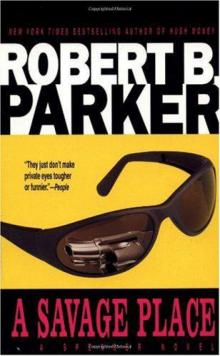 A Savage Place s-8
A Savage Place s-8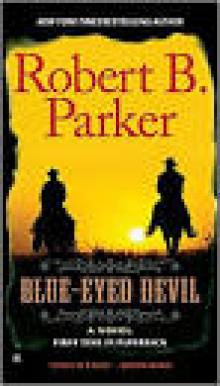 Appaloosa / Resolution / Brimstone / Blue-Eyed Devil
Appaloosa / Resolution / Brimstone / Blue-Eyed Devil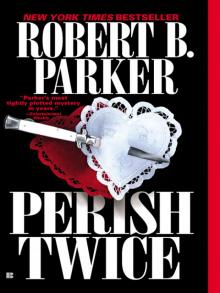 Perish Twice
Perish Twice Spare Change
Spare Change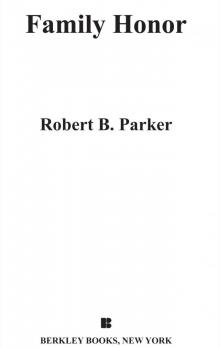 Family Honor
Family Honor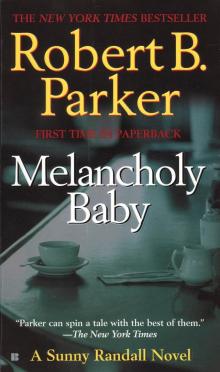 Melancholy Baby
Melancholy Baby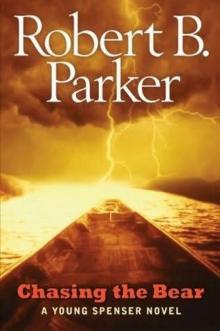 Chasing the Bear
Chasing the Bear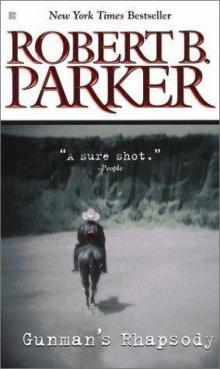 Gunman's Rhapsody
Gunman's Rhapsody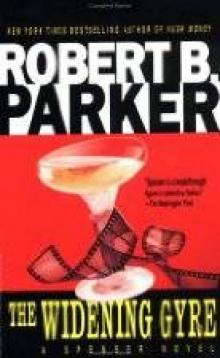 The Widening Gyre
The Widening Gyre Thin Air
Thin Air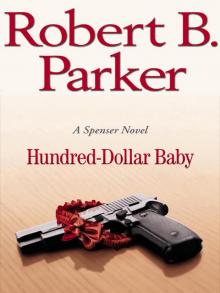 Hundred-Dollar Baby
Hundred-Dollar Baby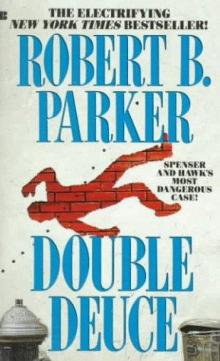 Double Deuce s-19
Double Deuce s-19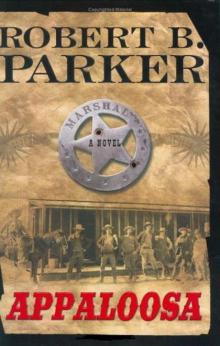 Appaloosa vcaeh-1
Appaloosa vcaeh-1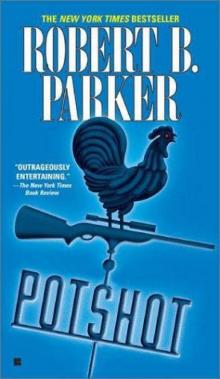 Potshot
Potshot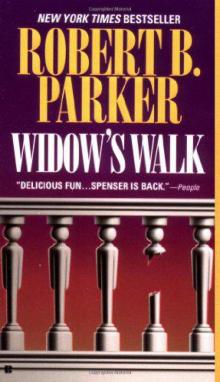 Widow’s Walk s-29
Widow’s Walk s-29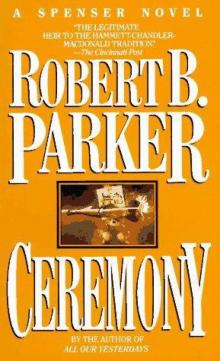 Ceremony s-9
Ceremony s-9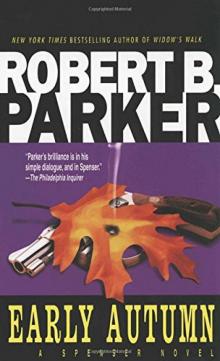 Early Autumn
Early Autumn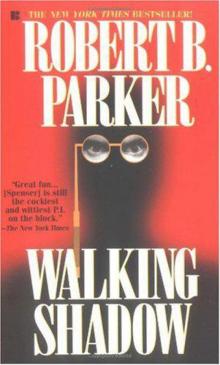 Walking Shadow s-21
Walking Shadow s-21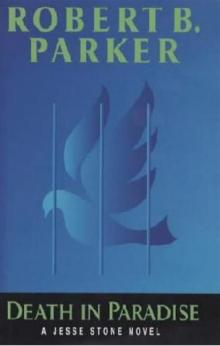 Death In Paradise js-3
Death In Paradise js-3 Shrink Rap
Shrink Rap Blue-Eyed Devil
Blue-Eyed Devil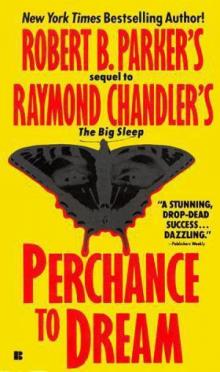 Perchance to Dream
Perchance to Dream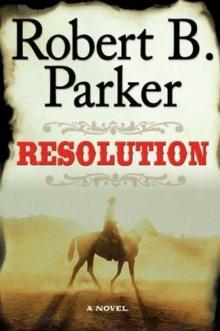 Resolution vcaeh-2
Resolution vcaeh-2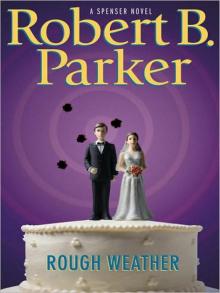 Rough Weather
Rough Weather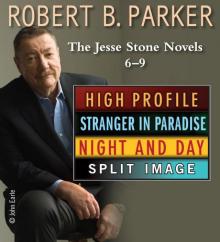 The Jesse Stone Novels 6-9
The Jesse Stone Novels 6-9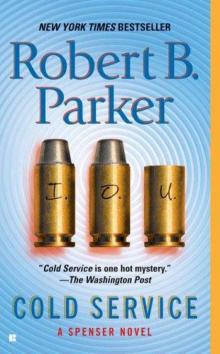 Cold Service s-32
Cold Service s-32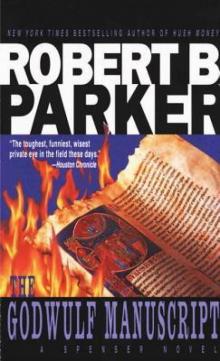 The Godwulf Manuscript
The Godwulf Manuscript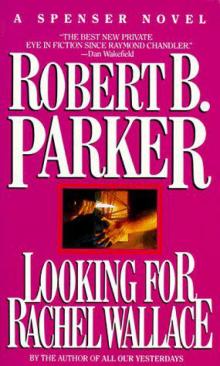 Looking for Rachel Wallace s-6
Looking for Rachel Wallace s-6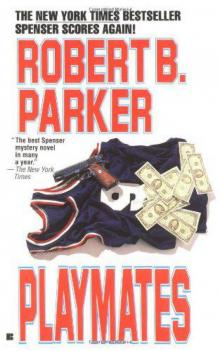 Playmates s-16
Playmates s-16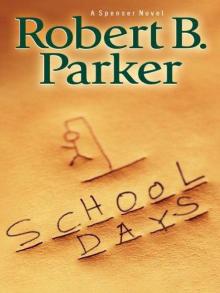 School Days s-33
School Days s-33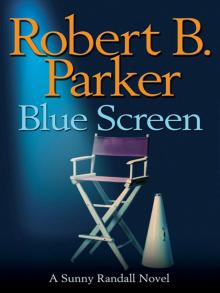 Blue Screen
Blue Screen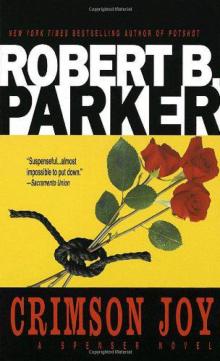 Crimson Joy
Crimson Joy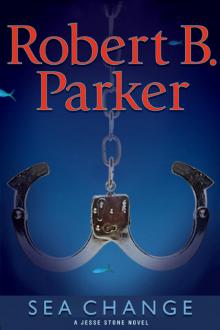 Sea Change js-5
Sea Change js-5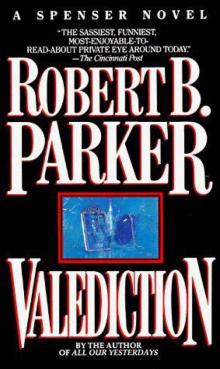 Valediction s-11
Valediction s-11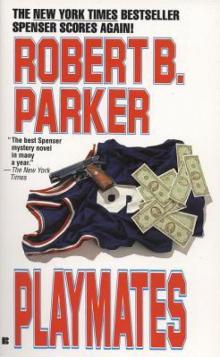 Playmates
Playmates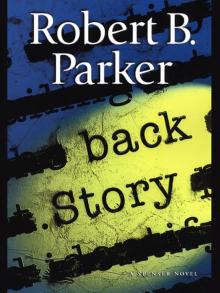 Back Story
Back Story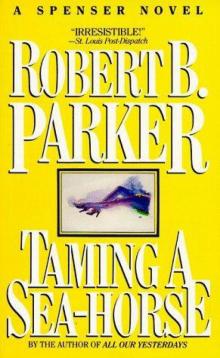 Taming a Sea Horse
Taming a Sea Horse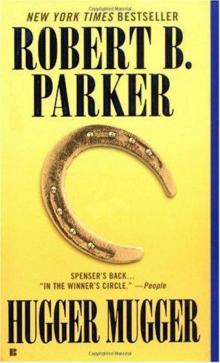 Hugger Mugger
Hugger Mugger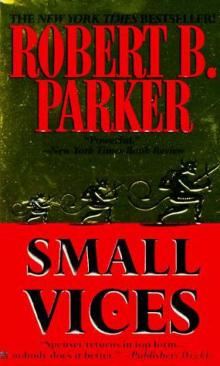 Small Vices s-24
Small Vices s-24 Silent Night: A Spenser Holiday Novel
Silent Night: A Spenser Holiday Novel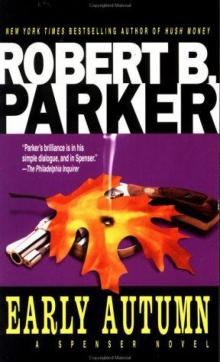 Early Autumn s-7
Early Autumn s-7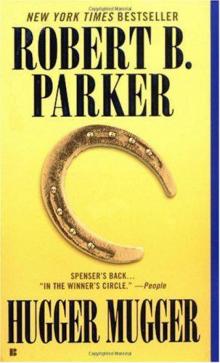 Hugger Mugger s-27
Hugger Mugger s-27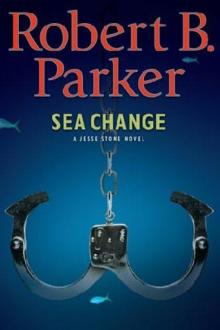 (5/10) Sea Change
(5/10) Sea Change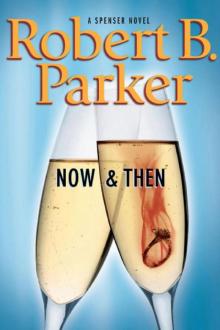 Now and Then
Now and Then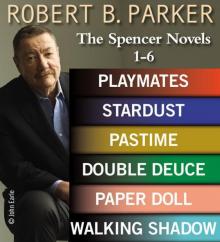 Robert B. Parker: The Spencer Novels 1?6
Robert B. Parker: The Spencer Novels 1?6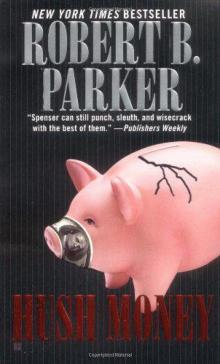 Hush Money s-26
Hush Money s-26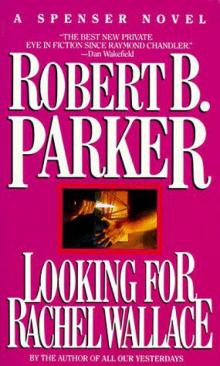 Looking for Rachel Wallace
Looking for Rachel Wallace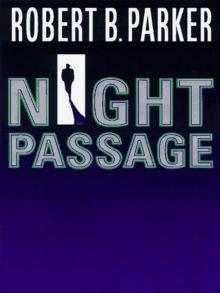 Night Passage
Night Passage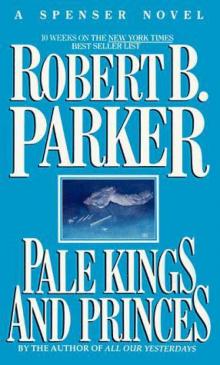 Pale Kings and Princes
Pale Kings and Princes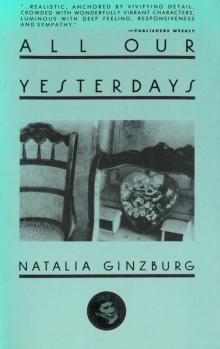 All Our Yesterdays
All Our Yesterdays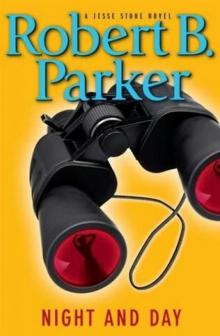 Night and Day js-8
Night and Day js-8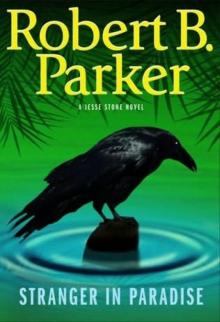 Stranger in Paradise js-7
Stranger in Paradise js-7 Double Play
Double Play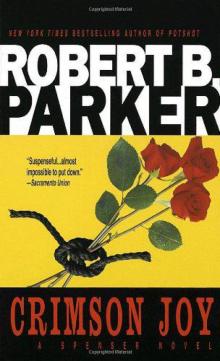 Crimson Joy s-15
Crimson Joy s-15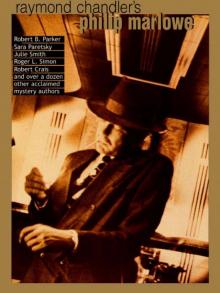 Raymond Chandler's Philip Marlowe
Raymond Chandler's Philip Marlowe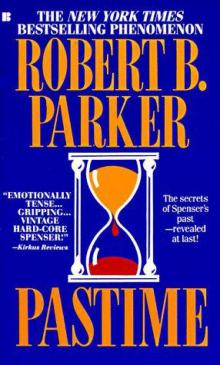 Pastime
Pastime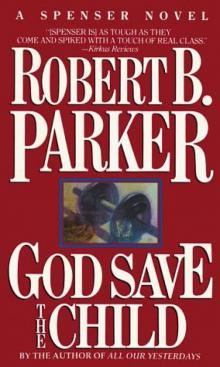 God Save the Child s-2
God Save the Child s-2 Bad Business
Bad Business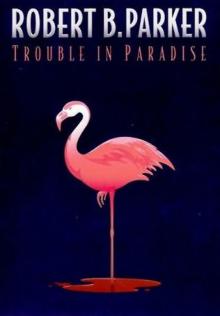 Trouble in Paradise js-2
Trouble in Paradise js-2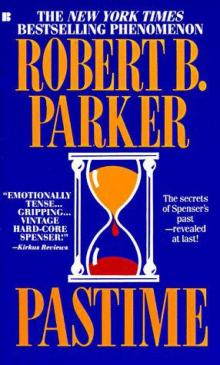 Pastime s-18
Pastime s-18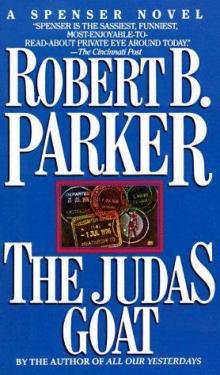 The Judas Goat s-5
The Judas Goat s-5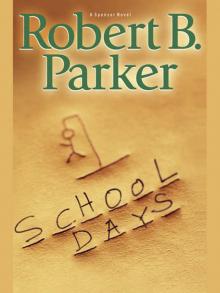 School Days
School Days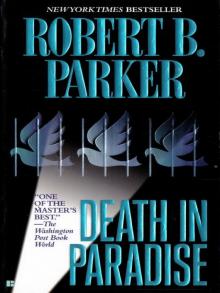 Death In Paradise
Death In Paradise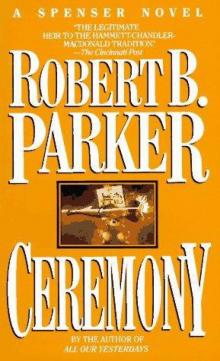 Ceremony
Ceremony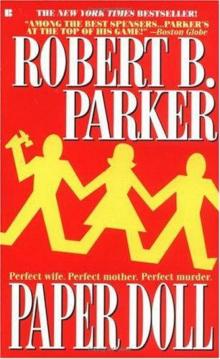 Paper Doll s-20
Paper Doll s-20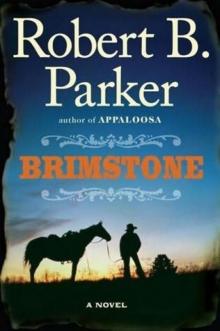 Brimstone vcaeh-3
Brimstone vcaeh-3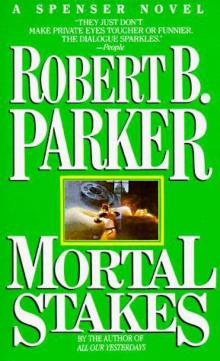 Mortal Stakes s-3
Mortal Stakes s-3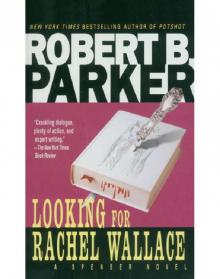 Spencer 06 - Looking for Rachel Wallace
Spencer 06 - Looking for Rachel Wallace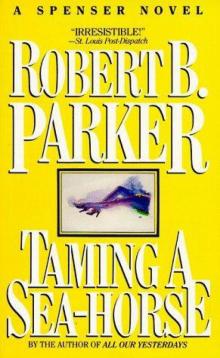 Taming a Sea Horse s-13
Taming a Sea Horse s-13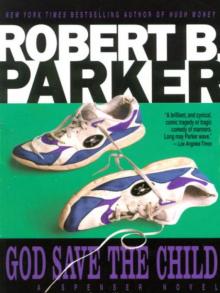 God Save the Child
God Save the Child Chance
Chance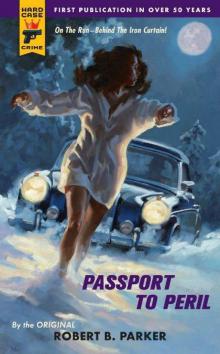 Passport To Peril hcc-57
Passport To Peril hcc-57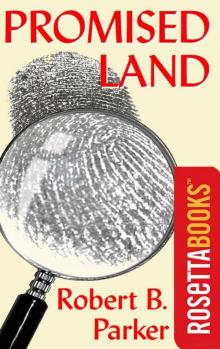 Promised Land
Promised Land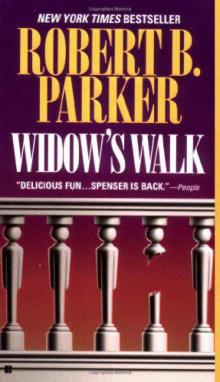 Widow’s Walk
Widow’s Walk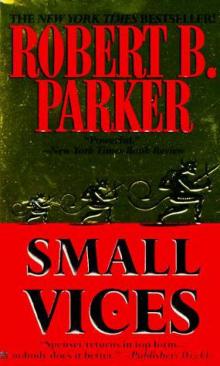 Small Vices
Small Vices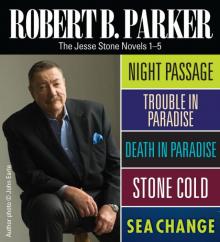 Robert B Parker: The Jesse Stone Novels 1-5
Robert B Parker: The Jesse Stone Novels 1-5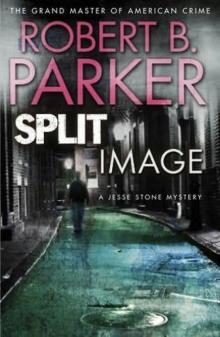 Split Image js-9
Split Image js-9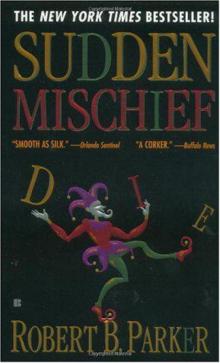 Sudden Mischief s-25
Sudden Mischief s-25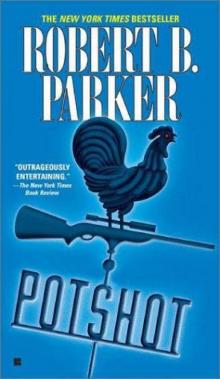 Potshot s-28
Potshot s-28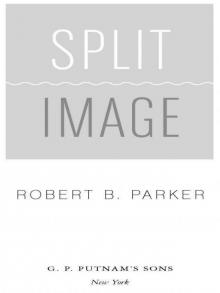 Split Image
Split Image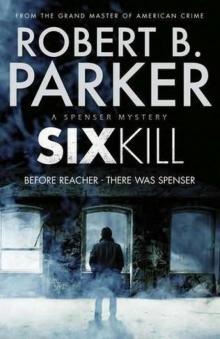 Sixkill s-40
Sixkill s-40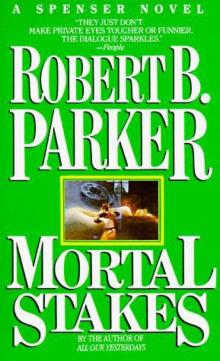 Mortal Stakes
Mortal Stakes Stardust
Stardust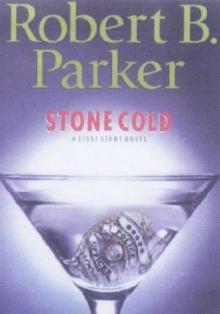 Stone Cold js-4
Stone Cold js-4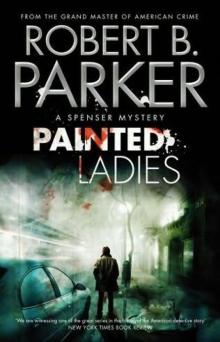 Painted Ladies s-39
Painted Ladies s-39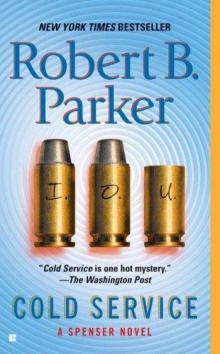 Cold Service
Cold Service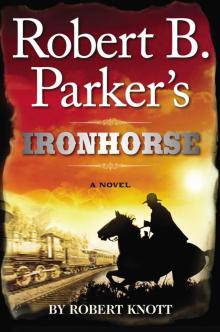 Ironhorse
Ironhorse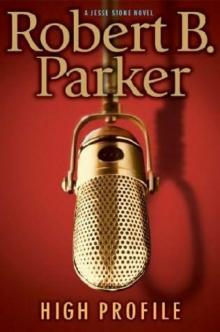 High Profile js-6
High Profile js-6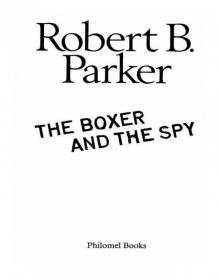 The Boxer and the Spy
The Boxer and the Spy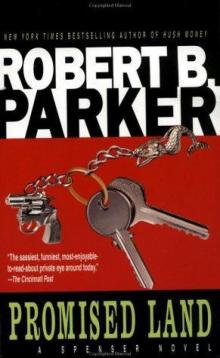 Promised Land s-4
Promised Land s-4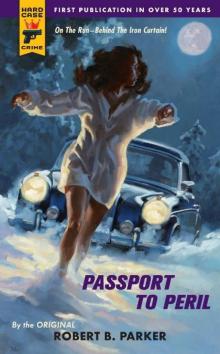 Passport to Peril (Hard Case Crime (Mass Market Paperback))
Passport to Peril (Hard Case Crime (Mass Market Paperback))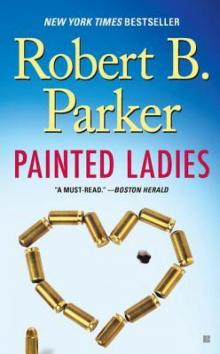 Painted Ladies
Painted Ladies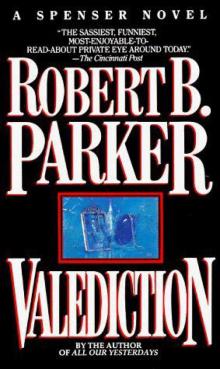 Valediction
Valediction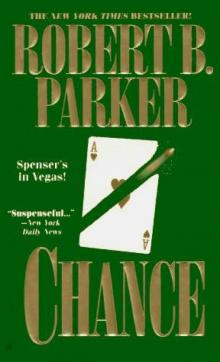 Chance s-23
Chance s-23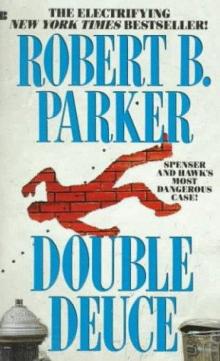 Double Deuce
Double Deuce Wilderness
Wilderness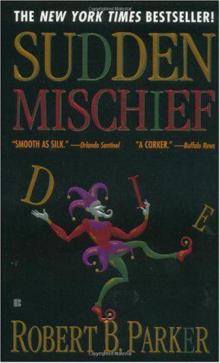 Sudden Mischief
Sudden Mischief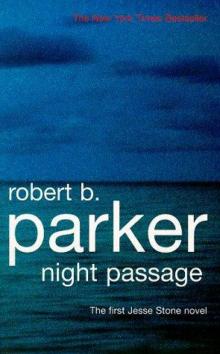 Night Passage js-1
Night Passage js-1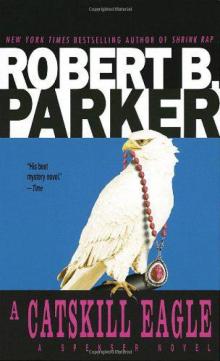 A Catskill Eagle
A Catskill Eagle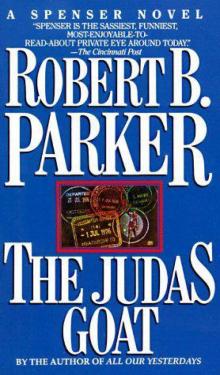 The Judas Goat
The Judas Goat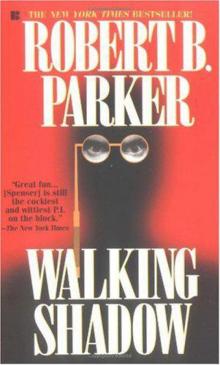 Walking Shadow
Walking Shadow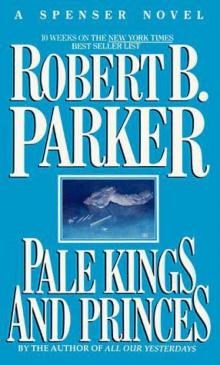 Pale Kings and Princes s-14
Pale Kings and Princes s-14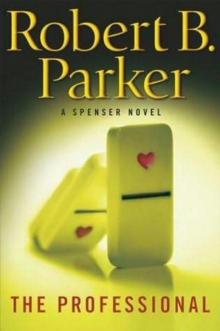 The Professional
The Professional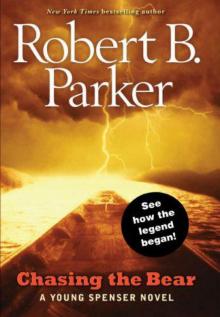 Chasing the Bear s-37
Chasing the Bear s-37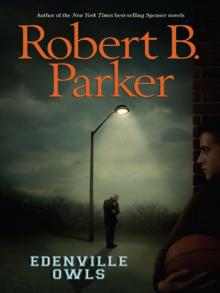 Edenville Owls
Edenville Owls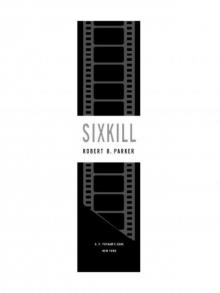 Sixkill
Sixkill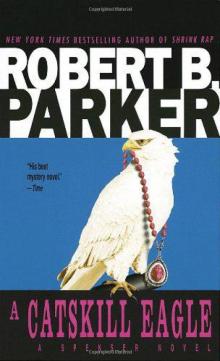 A Catskill Eagle s-12
A Catskill Eagle s-12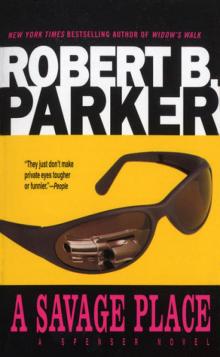 A Savage Place
A Savage Place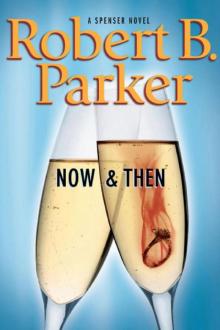 Now and Then s-35
Now and Then s-35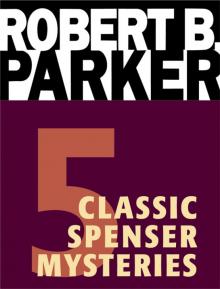 Five Classic Spenser Mysteries
Five Classic Spenser Mysteries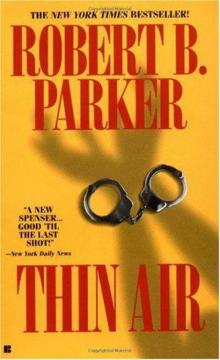 Thin Air s-22
Thin Air s-22